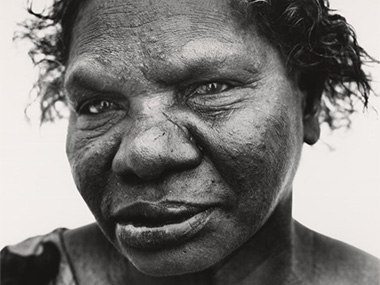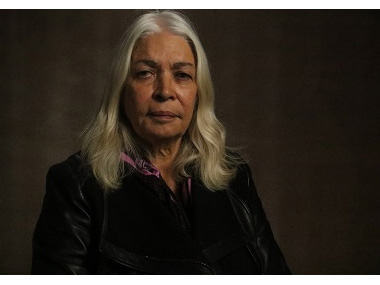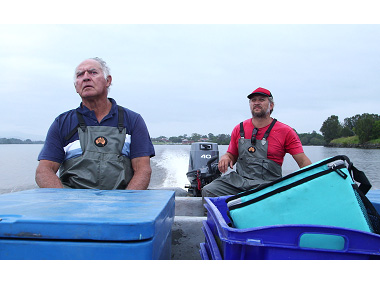WIK v TAREE

One of the powerful women of Wik, the late Gladys Tybingoompa, as photographed by Ricky Maynard
Posted by Jeremy Eccles | 14.06.18
Dates:
06.06.18
: 17.06.18
Two documentary films on significant Indigenous subjects came early in this year's Sydney Film Festival – which has such an honourable tradition of celebrating First Nations creativity. But what a gulf between the two. The first was an encyclopedic history of the history, legal issues and tragic consequences of the Wik Case, which might have made land rights such a potent tool for Aboriginal and Torres Strait Islander empowerment had not John Howard squibbed the issue. The second is a struggle towards understanding by a Biripi man from Taree in mid-NSW, keen as mustard to embrace his Aboriginal self but muddled by the realities of many mixed marriages.
The oddity for me is that, while both have their values, the Wik story is so much more important in Australia's understanding of itself, yet is missing from the Documentary Australia Foundation Award, designed to 'acknowledge excellence in documentary production' – while 'Teach a Man to Fish' is one of ten competitors for that prize. The only explanation offered by the Festival's documentary programmer - who made the decision - is that she had 65 films to choose from and took the ten best in her view. Having now seen the only other Indigenous film in the Award - 'Finke : There and Back' - I can say that in my view she left out the best!
'Wik v Queensland', directed by Dean Gibson, goes to the heart of Australia's problem in coming to terms with its First People, for, no sooner than the Highest judges in the land have comprehensively brought the Mabo Case over the water to mainland Australia and established that Terra Nullius was always a fiction than the conservative forces of the day gather in fear and trembling to nullify the result. There's John Howard totally losing his cool when faced by the backs of an audience turned in rejection of his Ten Point undermining of the High Court decision. For his legislation will deny Land Rights holders the power to negotiate with pastoralists and miners over access to land, and will, as Noel Pearson points out in the film, deny them the potential benefits of that 1996 decision just as mining in particular proceeded to boom.
And then there's the late Senator Harradine – the Catholic Independent whose vote is vital to getting Howard's mean project through. One minute he's seen dancing with the Wik as they lobby Parliament; the next he's washing his hands like Pilate because he's been convinced that Howard's threat of a double dissolution of Parliament will lead to a racially divisive election. Would Howard have dared to gamble his future on race? And where have I heard similar arguments again recently? Why, in the Prime Minister's reasoning not to hold referenda on same sex marriage and the Indigenous Voice to Parliament!
At its debut screening, director Gibson told us that film-making began because he'd been offered access to an amazing archive of Wik film showing the avid politics that lead up to the legal case – initially lost in the Queensland courts, then won in Canberra. This material throws up two things: the presence already of fresh-faced and slim young activists – the lawyer, Noel Pearson, a Cape York man himself and fully engaged in the fight and the anthropologist Marcia Langton - which they carry right through to today; and the counter-intuitive equal presence of Wik women in the fight. The stunning portrait of the late Gladys Tybingoompa that's being used on the film's flyers was part of a five-portrait series that Ricky Maynard made in 2000 called 'Returning To Places That Name Us'. After seeing the film, one has to wonder why four of that series were men and Gladys, a doughty debater on Wik rights, was the only woman. Where, for instance, is another hero of the film, Jean George?
What's easily forgotten is the early collusion between the Queensland government of Joh Bjelke-Petersen and the miners Comalco in the 70s to displace the five tribes of the Wik from their homes around Mapoon in the name of bauxite. Mapoon township was then burnt down. So the fight now is for the rest of their Country – where Joh wants to put a space port! Hopes rise in the 90s when a smiling Paul Keating invited Indigenous people into the Cabinet room to “make peace with Aborigines”. And, in the High Court, lawyer Walter Sofronoff makes the compelling case that no legislation in Australia has ever stipulated that a pastoral lease extinguished land rights, as was widely assumed.
But then the chalice of success is dashed from their lips by the implacable Howard. Reason indeed to fight for that Voice to Parliament so that the Wik and other Indigenous interpolaters can be heard in this land.
And so to fishing. Grant Saunders' family has done it from time immemorial on the Manning River in mid-North NSW. But Grant fancied a more urban life and has made it to Newcastle with a Norwegian wife and two buck-teethed kids. But there's something missing. For many a man that might simply be the lack of fame and fortune in a career. But for the blond and blue-eyed Grant – who, somehow got racially abused at school – there's a need to re-connect with the Biripi clan aspect of himself and to lead his kids there too.
But challenges in this emerge when he talks to his non-Indigenous Mum, who threatens his dream by reminding him how little room there seems to be for the rest of his heritage, and then throws down a gauntlet by suggesting that she has “just been an incubator” for his preferred Aboriginal persona.
His wife then adds a further complexity by pointing out that she certainly identifies as Norwegian, and wants her kids to identify too, though her origins are actually Brazilian! Which she certainly looks.
Where Grant might have taken all this when his fabulously laconic Dad, Ray needs a partner on the water when one of his many brothers retires, I can't imagine. But experienced producer Tom Zubrycki came aboard and, I suspect, brought a bigger picture to the film. He's added the Saunders' history of escape from the local Mission – Purfleet – in the name of freedom from its enforced dependence and freehold land, and the outrageous pressures that the State government has put on professional fisherman, putting two thirds of the Saunders' birthright on the Manning out-of-bounds in favour of recreational fishers. More voters there, I suppose.
So 'Teach a Man to Fish' (and he'll have food for life, as the saying goes) is more than a delightful battle between Grant and Ray as the former tries to impress his Dad by attaining some level of competence in fishing. But I have to say that the date to put in your diary is July 8th, when NITV will be showing 'Wik v Queensland' on the tele.
Share this:
»  del.icio.us
»
del.icio.us
»  Digg it
»
Digg it
»  reddit
»
reddit
»  Google
»
Google
»  StumbleUpon
»
StumbleUpon
»  Technorati
»
Technorati
»  Facebook
Facebook
Contact Details

Anthropologist and doughty Wik campaigner, Marcia Langton

The laconic Ray Saunders attempts to teach his son (and film-maker) Grant how to fish on the majestic Manning River
Further Research
Artists: Ricky Maynard
News Tags: fishing rights | Jeremy Eccles | John Howard | Land Rights | Marcia Langton | Noel Pearson | Sydney Film Festival | Wik Case
Exhibition Archive
- 08.06.18 | WARS & MASSACRES
- 03.06.18 | NY “Goes Ballistic” over Aboriginal Art
- 24.05.18 | THE LOCKHART BRAND IS BUOYED UP
- 03.05.18 | THE WYNNE'S A WINNER AGAIN
- 02.05.18 | NATSIAA FINALISTS ANNOUNCED
- 07.04.18 | ENGLAND'S EMILY?
- 04.04.18 | THE SONGKEEPERS
- 19.03.18 | ON GADI COUNTRY
- 16.03.18 | SPECIAL REQUEST
- 20.02.18 | Gapu-Monuk – Saltwater Barks
- 16.02.18 | SONGLINES SYMPOSIUM
- 06.02.18 | SONGLINES – TRACKING THE SEVEN SISTERS
- 31.01.18 | Dennis Nona Emerges in Hobart
- 30.11.17 | Great Artists, Great Stories, Limited Time
- 27.11.17 | Moodoonuthi - 'Little One'
Advertising

